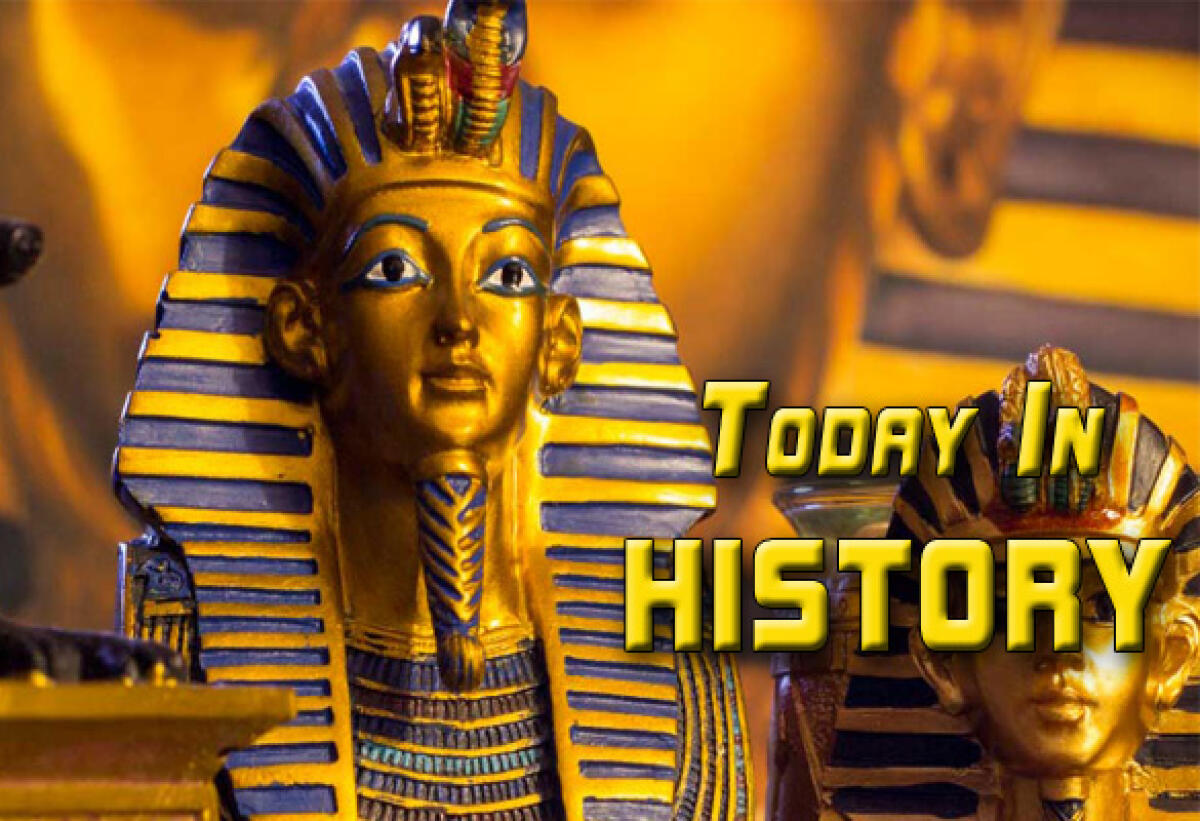- Friday, 30 January 2026
- Have a HOT TIP? Call 704-276-6587 or E-mail us At LH@LincolnHerald.com
Today In History – November 29
There are 32 days remaining until the end of the year.

Today in History in 1877 Thomas Edison demonstrates his phonograph for the first time; in 1922 Howard Carter opened the tomb of Pharaoh Tutankhamun ("King Tut") to the public; and in 1961 Project Mercury: The Mercury-Atlas 5 mission - Enos, a chimpanzee, is launched into space.
The On This Day In History archives at “Simple English Wikipedia, The Free Encyclopedia” contains over 200,000 events, birthdays and deaths from 6,000 years of history. Here is a roundup of a few of them:
November 29 is the 333rd day of the year (334th in leap years) in the Gregorian calendar. There are 32 days remaining until the end of the year.
EVENTS
561 - King Chlothar I dies at Compiegne, the Merovingian dynasty is continued by his four sons, Charibert I, Guntram, Sigebert I and Chilperic I, who divide the Frankish kingdom.
800 - Charlemagne arrives in Rome to investigate the alleged crimes of Pope Leo III.
939 - Edmund I is crowned King of England.
1394 - Korean king Yi Seong-gye, founder of the Joseon Dynasty, moves the capital city from Kaesong to Hanyang, present-day Seoul.
1729 - Natchez Native Americans massacre 138 Frenchmen, 35 French women and 56 children at Fort Rosalie near present-day Natchez, Mississippi.
1777 – San Jose, California, is founded as el Pueblo de San José de Guadalupe. It is the first civilian settlement, or pueblo, in Alta California.
1781 - The crew of British slave ship Zong murders 133 Africans by dumping them into the sea to claim insurance.
1783 - A magnitude 5.3 earthquake strikes New Jersey.
1830 - November Uprising: An armed rebellion against Russia's rule in Poland begins.
1847 - The Sonderbund is defeated by the joint forces of other Swiss cantons under Guillaume-Henri Dufour.
1850 - The "Punctation of Olmütz" treaty is signed. Prussia surrenders to Austria, which will take over the leadership of the German Confederation.
1864 – Indian Wars: Colorado volunteers, led by Colonel Chivington, massacre at least 150 people from the Cheyenne and Arapaho groups, who were unarmed, inside Colorado Territory.
1864 – American Civil War: In the Battle of Spring Hill, in the Confederate advance into Tennessee, the Confederates fail to crush the Union Army.
1877 – Thomas Edison demonstrates his phonograph for the first time.
1885 - End of the Third Anglo-Burmese War and the Burmese monarchy.
1890 – The Meiji Constitution goes into effect in Japan.
1899 - FC Barcelona is founded by Joan Gamper.
1922 – Howard Carter opened the tomb of Pharaoh Tutankhamun ("King Tut") to the public.
1929 - US Admiral Richard E. Byrd leads the first expedition to the South Pole.
1943 - World War II: The second session of the Anti-Fascist Council for the Liberation of Yugoslavia, held to determine the post-war ordering of the country, concludes in Jajce, present-day Bosnia and Herzegovina.
1944 – World War II: Albania is liberated by Albanian partisans.
1945 – The Federal People's Republic of Yugoslavia is declared.
1947 – The United Nations General Assembly votes to partition Palestine.
1950 – Korean War: North Korean and Chinese troops force United Nations forces to retreat from North Korea.
1952 – Korean War: U.S. President-elect Dwight D. Eisenhower fulfills a campaign promise by traveling to Korea to find out what can be done to end the conflict.
1961 - Project Mercury: The Mercury-Atlas 5 mission - Enos, a chimpanzee, is launched into space.
1963 – U.S. President Lyndon B. Johnson establishes the Warren Commission to investigate the assassination of President John F. Kennedy.
1963 – Trans-Canada Airlines Flight 831, a Douglas DC-8, crashes near Montreal shortly after take-off, killing 118 people.
1965 - The Canadian Space Agency launches the satellite Alouette 2.
1967 - The Sempor Dam breaks on the island of Java, flooding the town of Kebumen, killing between 160 and 200 people.
1967 – Vietnam War: US Defense Secretary Robert McNamara resigns.
1972 - Atari announces the release of Pong, the first commercially successful video game.
1975 – The name "Micro-soft" (for "microcomputer software") is first used in a letter from Bill Gates to Paul Allen.
1982 – The United Nations General Assembly passes United Nations Resolution 37/37, stating that Soviet Union forces should withdraw from Afghanistan.
1987 – Korean Air Flight 858 explodes over the Thai-Burmese border, killing 155 people.
1990 – Gulf War: The United Nations Security Council passes UN Security Council Resolution 678, allowing military action in Iraq if that nation did not withdraw its forces from Kuwait and free all foreign hostages by January 15, 1991.
2007 – Martinique is struck by a magnitude 7.4 earthquake.
2008 – The 2008 Mumbai terrorist attacks come to an end after a stand-off at the Taj Mahal Hotel.
2009 - Rwanda joins the Commonwealth of Nations. It is the second country, after Mozambique, to join despite having no colonial links to the United Kingdom.
2012 - The UN General Assembly approves a motion granting Palestine non-member observer status.
2013 - LAM Mozambique Airlines Flight 470 crashes in northeastern Namibia, killing all 34 people on board.
2013 - A police helicopter crashes into a pub in Glasgow, Scotland, killing all three people on board, and seven people in the pub, including one who died nearly two weeks later.
2017 - Bosnian-Croatian politician and general Slobodan Praljak dies after drinking cyanide at the end of his war crimes trial in The Hague.
2019 - Two people are stabbed and killed in the 2019 London Bridge stabbing; a separate stabbing in The Hague a few hours later injures three people.

 Lincoln Herald Staff
Lincoln Herald Staff
















